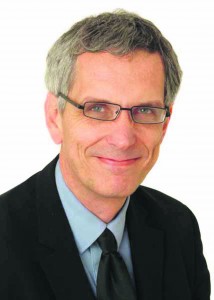WEDNESDAY, 18 JANUARY 2012
David clary is a Professor of theoretical chemistry and President of Magdalen College, Oxford. In 2009 he was appointed the first Chief Scientific Adviser to the Foreign and Commonwealth Office (FCO). In an interview with Ian Le Guillou he discusses what this role entails and how science is involved in foreign policy decision-making.The FCO was one of the last major government departments to appoint a Chief Scientific Adviser (CSA). Why did it eventually decide it needed one?
There are several departments in the FCO that deal increasingly with matters linked to science, so having a Chief Scientific Adviser was a useful step to take. There’s climate change and the science behind that, which has to keep in communication all the time. There are new renewable energies coming forward and the debate about whether to have nuclear or not, to have wind or not, the importance of shale gas and so on. Counter-proliferation and counter-terrorism are obviously of great interest; I can’t say much about that for confidential reasons but it really is a major concern of the FCO. Also there are territories that are still administered by the FCO and there are major scientific aspects of several of these.
What is your role within the FCO?
Some government departments have a very large budget and staff for science but not the Foreign Office, where the emphasis is more on influence with other countries. A very important part of the work that I do is to build partnerships to encourage collaboration between UK science and overseas science. I also work to promote UK public science and the FCO’s role in that, and to strengthen the science and engineering capacity in the FCO. In addition, I engage with the cross-government group of science advisers and provide advice to the Foreign Secretary, ministers and officials on science, technology and innovation.
Is there much collaboration between the CSAs in government?
There is the scientific advisory group for emergencies, on which many of the CSAs sit. This seems to have to meet every Easter. About three years ago we had swine flu and we had to meet then. Then two years ago we had the volcanic ash, and just last year we had the Fukushima disaster. That was, I think, a very good example of getting the CSAs and many other important scientists together very quickly to give advice to the government.
What drew you to apply for this position?
As a scientist I have worked in many countries and am a great believer in international collaboration. This lets you do better science and also improves relations between countries—what we call ‘science diplomacy’. So the job in the FCO allows me to be a science diplomat!
How did a career in theoretical chemistry prepare you for this role?
Well it has given me very broad scientific interests—all the way from astrophysics to atmospheric science to biomolecules. So that is quite a good background for the very broad reach of scientific topics relevant in the FCO, which covers space, the deep sea and even Antarctica.
What has been the highlight of your experience with the FCO?
I got the previous Foreign Secretary David Miliband to give a speech at the Royal Society where he compared the revolution in science in the 20th century to the major changes in foreign affairs over the same period—from certainty to complexity.
How will science shape our foreign policy over the next decade?
Science and its link to innovation is a crucial part of growth and prosperity and most businesses depend critically on trade overseas. Thus science and innovation will have an increasing relevance for foreign policy as we aim to restore financial security to this country.
Ian Le Guillou is a 3rd year PhD student in the Department of Biochemistry

